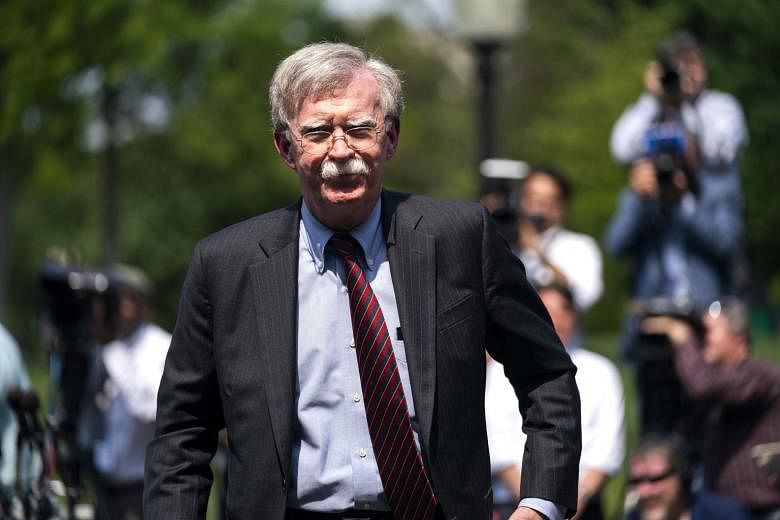WASHINGTON (AFP) - Donald Trump stunned Washington once again on Tuesday (Sept 10) with a tweet saying he had fired John Bolton, his national security adviser who has pushed US foreign policy to the right for decades.
But just 20 minutes afterward, Bolton - a consummate insider despite his contempt for the establishment - hit back with his own tweet and text messages to reporters, already showing daylight with Trump by saying that he had quit on his own.
Bolton, who lasted 17 months at the helm of national security policy in Trump's turbulent White House, has always been a Washington fighter, more willing than virtually any other senior US official to deploy military force - and waging his battle deep within the bureaucracy.
An unapologetic campaigner for the Iraq invasion who at times advocated war against Iran and North Korea, Bolton was so controversial that former president George W. Bush had to bypass the Senate to appoint him ambassador to the United Nations.
After leaving the Bush White House, Bolton relished his role as a media commentator, stridently denouncing Barack Obama and flirting with his own presidential run.
He had seemed like a relic from an earlier time - until the television-loving Trump saw him on Fox News.
The mogul-turned-president was impressed by the loquacious expert, although he reportedly was put off by one of Bolton's signature traits - his bushy moustache.
Bolton joined despite clear philosophical differences with Trump, who has frequently called for less US involvement overseas.
"He has strong views on things but that's okay," Trump said in May. "I actually temper John, which is pretty amazing."
Suzanne DiMaggio, a foreign policy scholar at the Carnegie Endowment for International Peace, said Bolton survived so long in part because he shattered the painstaking decision-making process, which Trump holds in contempt.
"Bolton played an important role for Trump - he freed him from the bureaucratic constraints of a national security policy process by demolishing it," she said.
FROM 'HUMAN SCUM' TO AIDE
But Bolton's differences with the rest of the Trump team had increasingly been out in the open.
Bolton had been highly critical of talks with Afghanistan's Taleban, so much so that The Washington Post reported that he was excluded from seeing a draft plan on pulling US troops.
He also would have furiously protested a summit with Iran, as mulled by Trump. Bolton has long been close to Iran's militant exiled opposition, telling them at a rally shortly before he was appointed that they would go together to Teheran to celebrate regime change "before 2019."
And when Trump walked onto North Korean soil in June to see leader Kim Jong Un, Bolton - once branded "human scum" by Pyongyang for his hawkish stance - headed to Mongolia.
Trump has also seemed increasingly uninterested in speaking about Venezuela, a major cause for Bolton who wants to oust leftist leader Nicolas Maduro.
Of all issues, Bolton has said he is proudest of his efforts under both Bush and Trump to disrupt the International Criminal Court, believing it could target Americans and violate US sovereignty.
In one of Bolton's most memorable remarks, he dismissed the United Nations in a 1994 speech, quipping that if the 38-floor secretariat in New York "lost 10 stories, it wouldn't make a bit of difference." - Working-class roots - Bolton traces his views, including his fervent denunciations of what he sees as elitism within an internationalist-minded foreign policy establishment, to his working-class childhood in Baltimore.
He recalls how his father, a firefighter, was told he could not register as a Republican in the heavily Democratic city.
Bolton's contempt for elites grew as he attended Yale University, where he was a rare conservative and supporter of the Vietnam War.
Bolton, however, did not serve in the war, instead joining the National Guard. In his memoir, he voiced some regret but blamed his decision on liberals.
"Dying for your country was one thing, but dying to gain territory that antiwar forces in Congress would simply return to the enemy seemed ludicrous to me," he wrote.
Describing his working-class upbringing to the right-wing news site Breitbart, Bolton said that he still followed lessons from his firefighter father.
"My father used to always say: 'Don't start fights, but if you get in one finish them.'"

